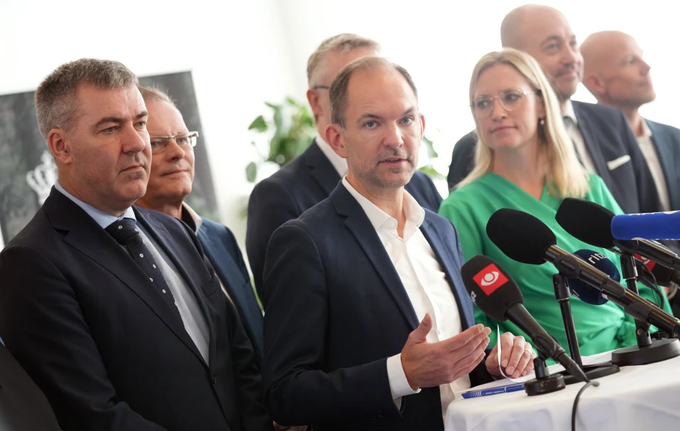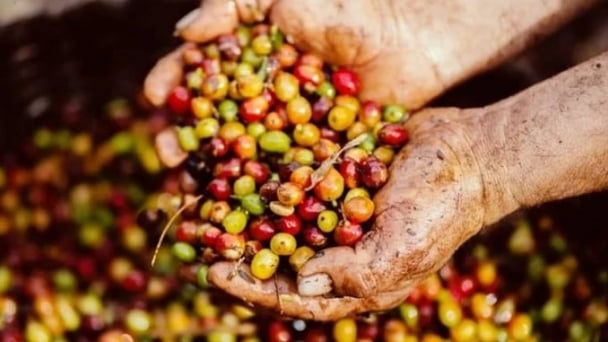June 18, 2025 | 06:49 GMT +7
June 18, 2025 | 06:49 GMT +7
Hotline: 0913.378.918
June 18, 2025 | 06:49 GMT +7
Hotline: 0913.378.918

Denmark’s Minister for the Green Tripartite Jeppe Bruus, center, and members of the coalition present a political agreement on the so-called green tripartite deal at the ministry in Copenhagen, Denmark, Monday, Nov. 18, 2024.
The government called the agreement “the biggest change to the Danish landscape in over 100 years.”
“The Danish nature will change in a way we have not seen since the wetlands were drained in 1864,” said Jeppe Bruus, head of Denmark’s Green Tripartite Ministry, created to implement a green deal reached in June among farmers, the industry, the labor unions and environmental groups.
Under the agreement, 43 billion kroner ($6.1 billion) have been earmarked to acquire land from farmers over the next two decades, the government said.
Danish forests would grow on an additional 250,000 hectares (618,000 acres), and another 140,000 hectares (346,000 acres), which are currently cultivated on climate-damaging low-lying soils, must be converted to nature. Currently, 14.6% of land is covered by forests.
The deal was reached by the three-party Danish government — made up of the Social Democrats, the Liberals and the center Moderates — and the Socialist People’s Party, the Conservatives, Liberal Alliance and the Social Liberal Party.
A vote in parliament on the deal is considered a formality.
In June, the government said livestock farmers will be taxed for the greenhouse gases emitted by their cows, sheep and pigs from 2030, the first country to do so as it targets a major source of methane emissions, one of the most potent gases contributing to global warming.
(AP)
![Turning wind and rain into action: [7] Early disaster warnings help marine farmers minimize losses](https://t.ex-cdn.com/nongnghiepmoitruong.vn/608w/files/news/2025/06/17/z6704423696987_15fd32ffc26d590d204d520c9dac6786-nongnghiep-142942.jpg)
(VAN) In recent years, thanks to early disaster warnings and forecasting, marine farmers in Khanh Hoa province have been able to reduce risks and losses, thereby improving production efficiency.
![Turning wind and rain into action: [6] ‘Four on-the-spot’ disaster management software](https://t.ex-cdn.com/nongnghiepmoitruong.vn/608w/files/news/2025/06/17/e5a48259d6a262fc3bb3-nongnghiep-183800.jpg)
(VAN) By simply activating the scenario on the disaster management software, the relevant authorities immediately know how many households need to be evacuated, where to evacuate them to, and by what means of transportation…
![Turning wind and rain into action: [5] Hue applies modern technology in disaster forecasting](https://t.ex-cdn.com/nongnghiepmoitruong.vn/608w/files/news/2025/06/17/z6704423696987_15fd32ffc26d590d204d520c9dac6786-nongnghiep-093938.jpg)
(VAN) In Hue city, modern technology has recently been applied in meteorological and hydrological forecasting and warning, helping to reduce the damage caused by natural disasters.

(VAN) A cutting-edge farming technique being implemented on an experimental ranch in Arizona's Sonoran Desert has already saved a billion gallons of water over five years, according to Civil Eats.

(VAN) Poultry and pig production and the environment can be boosted through enhanced water technology, according to new research.

(VAN) Coffee prices on June 16, 2025 are unchanged. In Vietnam, local trading prices are holding steady, ranging around VND 112,000 – VND 112,500/kg.
![Turning wind and rain into action: [4] Bringing climate bulletins to remote and isolated areas](https://t.ex-cdn.com/nongnghiepmoitruong.vn/608w/files/linhnhp/2025/06/14/1152-z6704423696987_15fd32ffc26d590d204d520c9dac6786-nongnghiep-151141.jpg)
(VAN) The Vietnam Agriculture and Nature Newspaper interviewed Mr. Vu Thai Truong, Acting Head of Climate Change and Environment at UNDP Vietnam, to gain deeper insight into how climate bulletins are delivered to farmers.